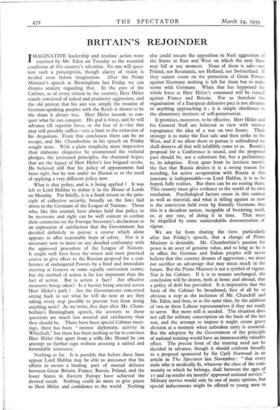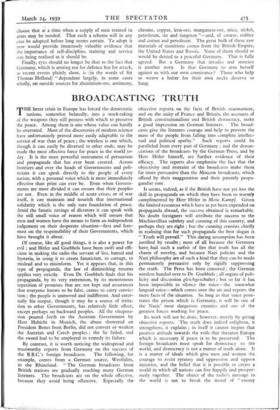BRITAIN'S REJOINDER
IMAGINATIVE leadership and resolute action were enjoined by Mr. Eden on Tuesday as the essential conditions of this country's salvation. No one will ques- tion such a prescription, though clarity of vision is needed even before imagination. After the Prime Minister's speech at Birmingham last Friday we can dismiss anxiety regarding that. In the eyes of the Cabinet, as of every citizen in the country, Herr Hitler stands convicted of naked and predatory aggression, and the old pretext that his aim was simply the reunion of German-speaking peoples with the Reich is shown to be the sham it always was. Herr Hitler intends to con- quer what he can conquer. His god is force, and he will advance till superior force, or the fear of it—for that may still possibly suffice—sets a limit to the extension of his despotism. From that conclusion there can be no escape, and Mr. Chamberlain in his speech on Friday sought none. With a plain simplicity more impressive than elaborate eloquence he enumerated the violated pledges, the jettisoned principles, the shattered hopes, that are the legacy of Herr Hitler's last brigand stroke. He believed still that his policy of appeasement had been right, but he was under no illusion as to the need of applying a very different policy now.
What is that policy, and is it being applied ? It was left to Lord Halifax to define it in the House of Lords on Monday. Put briefly, it is a frank return to the prin- ciple of collective security, broadly on the lines laid down in the Covenant of the League of Nations. Those who, like this journal, have always held that policy to be necessary and right can be well content to confine their comments on the Foreign Secretary's declaration to an expression of satisfaction that the Government has decided definitely to pursue a course which alone appears to offer reasonable hope of safety. Nor is it necessary now to insist on any detailed conformity with the approved procedure of the League of Nations. It might well have been the wisest and most practical course to give effect to the Russian proposal for a con- ference of endangered Powers by a brief and immediate meeting at Geneva or some equally convenient centre, but the method of action is far less important than the fact of action. But is action a fact? Are effective measures being taken? Is a barrier being erected across Herr Hitler's path ? Are the Governments concerned sitting back to see what he will do next or are they taking every step possible to prevent him from doing anything next? As we write, five days after Mr. Cham- berlain's Birmingham speech, the answers to those questions are much less assured and satisfactory than they should be. There have been special Cabinet meet- ings, there has been "intense diplomatic activity in Whitehall," but there has been nothing so far to convince Herr Hitler that apart from a trifle like Memel he can attempt no further rape without arousing a united and formidable resistance.
Nothing so far. It is possible that before these lines appear Lord Halifax may be able to announce that his efforts to secure a binding pact of mutual defence between Great Britain, France, Russia, Poland, and the lesser States in Eastern Europe have achieved the desired result. Nothing could do more to give pause to Herr Hitler and confidence to the world. Nothing else could ensure the opposition to Nazi aggression of the States in East and West on which the next blow may fall at any moment. None of them is safe—not Poland, not Roumania, not Holland, not Switzerland. If they cannot count on the protection of Great Powers against Germany nothing is left for them but to make terms with Germany. When that has happened the whole force at Herr Hitler's command will be turned against France and Britain. For us therefore the organisation of a European defensive pact is not altruism or anything approaching it ; it is simple obedience to the elementary instincts of self-preservation.
It promises, moreover, to be effective. Herr Hitler and his General Staff are believed to view with intense repugnance the idea of a war on two fronts. Their strategy is to make the East safe and then strike in the West, and if we allow them to pursue it unhindered we shall deserve all that will infallibly come to us. Russia's proposal for a Conference is sound, and the proposed pact should be, not a substitute for, but a preliminary to, its adoption. Even apart from its intrinsic merits, the fact that Russia desires it is a strong reason for acceding, for active co-operation with Russia at this juncture is indispensable—as Lord Halifax, it is to be hoped, fully realises. But there can be no resting there. This country must give evidence to the world of its own resolution. Psychological factors count in this contest as well as material, and what is telling against us now is the conviction held even by friendly Germans that this is a decadent nation, incapable of bestirring itself, or, at any rate, of doing it in time. That must be dispelled by some unmistakable demonstration of vigour.
We are far from sharing the view, particularly after last Friday's speech, that a change of Prime Minister is desirable. Mr. Chamberlain's passion for peace is an asset of genuine value, and so long as he is in office the German and Italian peoples will never believe that this country dreams of aggression ; we must not sacrifice an advantage that may mean much in the future. But the Prime Minister is not a symbol of vigour. Nor is his Cabinet. If it is to remain unchanged, the conclusion will be drawn, both at home and abroad, that a policy of drift has prevailed. It is imperative that the basis of the Cabinet be broadened, first of all by so obvious a step as the inclusion of Mr. Churchill and Mr. Eden, and then, or at the same time, by the addition of two or three Labour representatives if they are ready to serve. But more still is needed. The situation does not call for military conscription on the basis of the last war, and the attempt to impose it might create grave division at a moment when unbroken unity is essential. But the adoption by the Government of the principle of national training would have an immeasurably valuable effect. The precise form of the training need not be decided in advance, though it should conform broadly to a proposal sponsored by Sir Cyril Norwood in an article in The Spectator last November: "that every male who is medically fit, whatever the class of the com- munity to which he belongs, shall between the ages of 17 and 19 render six months' approved national service." Military service would only be one of many options, but special inducements might be offered to young men to choose that at a time when a supply of men trained in arms may be needed. That such a scheme will in any case be adopted before long seems certain. To adopt it now would provide immensely valuable evidence that the importance of self-discipline, training and service was being realised as it should be.
Finally, eyes should no longer be shut to the fact that Germany, which is arming not for defence but for attack, as recent events plainly show, is (in the words of Sir Thomas Holland) "dependent largely, in some cases wholly, on outside sources for aluminium-ore, antimony, chrome, copper, iron--ore, manganese-ore, mica, nickel, petroleum, tin and tungsten "—and, of course, rubber and cotton and petroleum. The great bulk of these raw materials of munitions comes from the British Empire, the United States and Russia. None of them should or would be denied to a peaceful Germany. That is fully agreed. But a Germany that invades and annexes is another story. Is that Germany to arm herself against us with our own connivance? Those who help to weave a halter for their own necks deserve to hang.















































 Previous page
Previous page